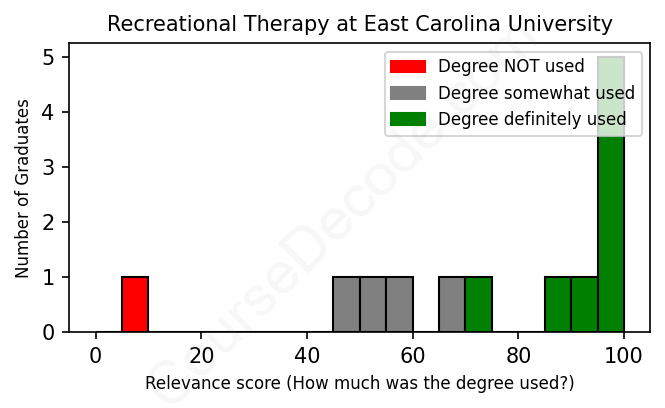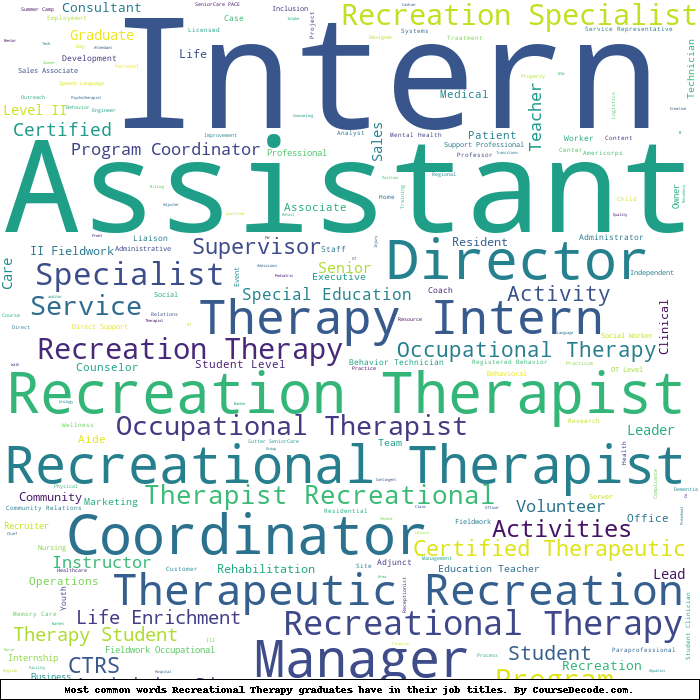
First, some facts. Of the Recreational Therapy graduates from East Carolina University we've analyzed , here's how many have used (or NOT used) their degree in their career:

These are estimates based on AI analysis of 13 LinkedIn profiles (see below).
The verdict? Above average. Overall, with an average relevance score of 75%, Recreational Therapy graduates from East Carolina University have a higher likelihood (+8%) of finding work in this field compared to the average graduate across all fields:
And for comparison, here's the chart for all profiles we've looked at across all degrees.
Also, after graduating, only 15% of these graduates have pursued further education other than another Bachelor's degree (such as a Masters degree or other), compared to the average across all profiles of 35%. This suggests a Bachelors degree is enough for most Recreational Therapy graduates, and it's normal to look for work straight after graduation.
See the details:
|
Relevance score: 89% We think this person has gone into a career highly relevant to their degree. We think this person has gone into a career highly relevant to their degree.
DEGREE INFOGraduated in 2012 from East Carolina University with a Bachelors Degree in Recreational Therapy. No other secondary education since. JOB HISTORY SINCE GRADUATIONRecreational Therapist Carolinas HealthCare System Jul 2013 - Jan 2016 Program Coordinator  Accessible Coastal Carolina Events Sports and Services, Inc. (ACCESS of Wilmington) Jan 2016 - Mar 2017 Program Coordinator  Brooks Rehabilitation Mar 2017 - Mar 2018 Program Specialist  Brooks Rehabilitation Mar 2018 - Present Assistant Clinical Research Associate  PPD Jul 2021 - Present ABOUTNo information provided. |
The top 10 most common jobs done by the graduates we've analyzed (ranked most common to least) are:
It seems that graduates from East Carolina University with a degree in Recreational Therapy have found a mix of jobs, with a decent number directly related to their field of study. Many alums have taken on roles like Recreational Therapists, Program Coordinators, and Therapists in various healthcare settings, such as hospitals and rehabilitation centers. These positions allow them to utilize their therapeutic skills and provide recreational activities that contribute to clients' well-being, which is the essence of what they learned during their degree program. For instance, roles like Certified Therapeutic Recreation Specialist and Recreation Programmer are solid examples where the skills from their education are applied effectively.
However, there are also several graduates who have ventured into jobs that don’t fully tap into their training in Recreational Therapy. Positions in customer service, sales, and even some administrative roles appear to be far removed from the therapeutic principles they studied. While some of these roles—like being a Professional Recruiter or a Preschool Teacher—might use a bit of the interpersonal skills learned in Recreational Therapy, they don’t engage deeply with therapeutic practices. Overall, while many graduates are effectively leveraging their degree, there seems to be a significant subset of them who have taken paths that don’t directly align with their training in Recreational Therapy.
Here is a visual representation of the most common words in job titles for Recreational Therapy graduates (this is across all Recreational Therapy graduates we've analyzed, not just those who went to East Carolina University):

When you look at the career paths of graduates from East Carolina University who studied Recreational Therapy, there's quite a mix of success stories and some that meander away from the field. It seems a decent number of folks land their first jobs in directly related positions shortly after graduation, such as recreational therapist internships or roles within mental health facilities. For example, many students turn their internships into full-time roles, reflecting a strong initial move into the field. However, not everyone stays on that path—some start to branch out and take jobs that are a bit of a stretch from recreational therapy, like sales or even administrative roles in hospitals after some experience.
If we look at where these graduates end up around five to ten years after graduating, we can see more variety. Several have transitioned into more specialized roles, such as occupational therapy or program coordinating, which still leverage their knowledge in recreational therapy but may not stick strictly to that title. Others have ventured into management positions or completely different industries, indicating a possibility of detours from their original career intent. Overall, while many do find rewarding careers in or adjacent to recreational therapy, there are noticeable paths that veer off into unrelated areas, especially as time goes on and people seek new opportunities. It's a reminder of how versatile a degree like this can be, but also how some may feel the need to pivot as their careers progress.
A Bachelor’s degree in Recreational Therapy generally has a pretty balanced mix of coursework, so it’s not super easy, but it’s also not the hardest degree out there. At East Carolina University, like many places, you’ll have classes that cover everything from therapeutic techniques to anatomy and psychology, which can be a bit challenging, especially if you’re not into science or health stuff. You’ll probably also have some hands-on practical experiences that can be demanding, but they’re a great way to learn. Overall, if you’re passionate about helping others and enjoy engaging activities, you might find that the challenges are totally manageable and even rewarding!
Most commonly, in the LinkedIn profiles we've looked at, it takes people 4 years to finish a Bachelor degree in Recreational Therapy.
Looking at these Recreational Therapy grads from East Carolina University, it seems like they've had a mix of financial success depending on their career paths. Some have landed solid positions, especially those working in clinical settings like Occupational Therapists and Clinical Supervisors, which usually pay pretty well. For example, the Clinical Supervisor at the US Army is likely making decent money after over a decade in service. Others, like some in sales or less stable social service roles, might not be raking it in as much—especially those at entry-level positions or roles that are more internship-focused. Overall, it seems like a few of them are doing well financially, but many others might still be working their way up the ladder.
Here is a visual representation of the most common words seen in the "about" section of LinkedIn profiles who have a Bachelor degree in Recreational Therapy (this is across all Recreational Therapy graduates we've analyzed, not just those who went to East Carolina University). This may or may not be useful:

Here are all colleges offering a Bachelor degree in Recreational Therapy (ordered by the average relevance score of their Recreational Therapy graduates, best to worst) where we have analyzed at least 10 of their graduates:
| College | Score | Count |
|---|---|---|
 Indiana University Bloomington Indiana University Bloomington
|
80 | 11 |
 East Carolina University East Carolina University
|
75 | 13 |
 Florida International University Florida International University
|
69 | 12 |
 Central Michigan University Central Michigan University
|
61 | 10 |